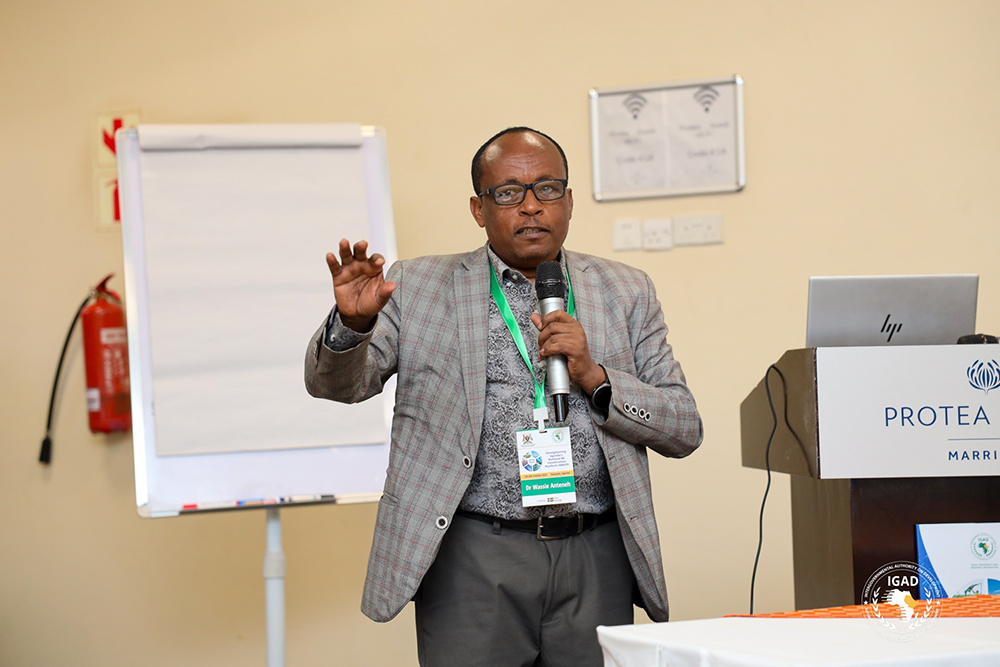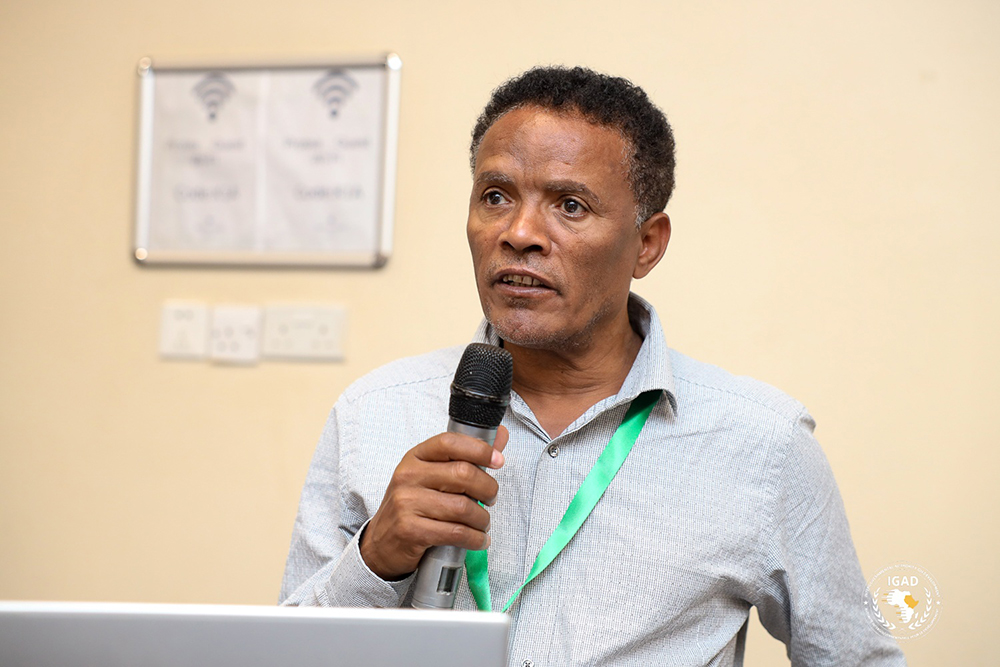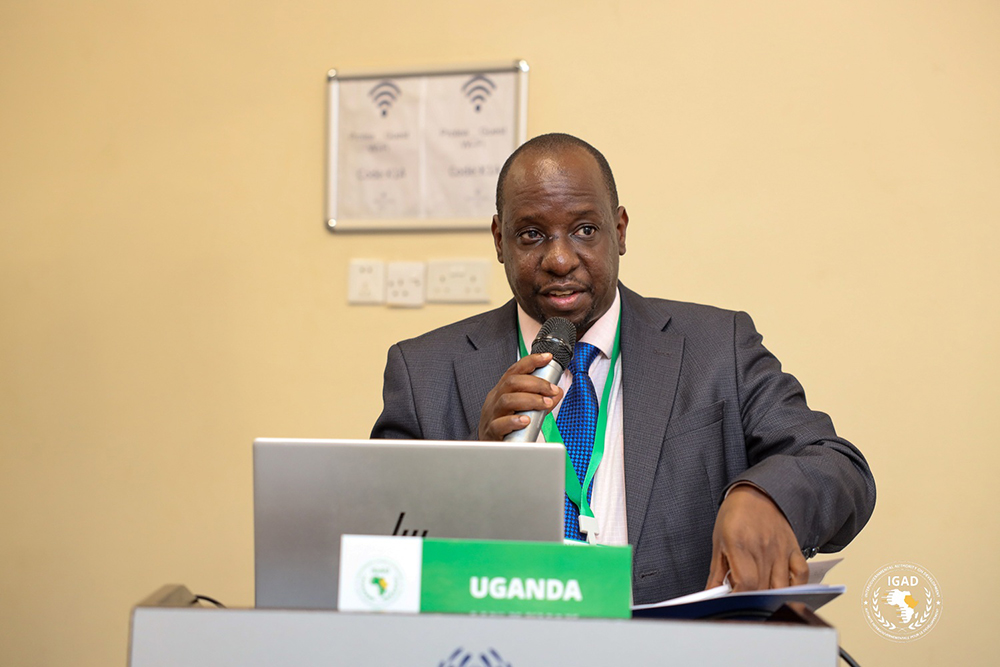IGAD gathers stakeholders to strengthen Uganda blue economy co-ordination
The Intergovernmental Authority on Development (IGAD), in collaboration with Uganda’s water and environment ministry, the lead agency for blue economy matters, organised the two-day engagement to take stock of the progress the country has made since it launched its blue economy strategy about two years-and-a-half ago.
Dr Wasi Anteneh from the IGAD Secretariat. (Courtesy photo)
_________________
In a move aimed at strengthening Uganda’s National Blue Economy Co-ordination Platform (NBECP), IGAD has gathered stakeholders from several ministries, agencies and departments (MDAs) of the Government.
The Intergovernmental Authority on Development (IGAD), in collaboration with Uganda’s water and environment ministry, the lead agency for blue economy matters, organised the two-day engagement to take stock of the progress the country has made since it launched its blue economy strategy about two years-and-a-half ago.
The Government, on February 22, 2023, adopted a national Blue Economy (BE) strategy after validating it and committed to implementing it for the benefit of the over five million people whose livelihoods depend on the sectors involved in the BE.
BE relates to the sustainable use and conservation of aquatic resources: Oceans, seas, lakes, rivers, wetlands, groundwater, to drive economic growth, improve livelihoods and create jobs, while ensuring protection of the environment, cultural values and biodiversity.
The strategy proposes interventions for conservation and sustainability of fisheries, aquaculture and aquatic ecosystems.
The Government, through ministers: Bright Rwamirama (agriculture state), Aisha Sekindi (water and environment state) and works ministry representative by transport director Benon Kajuna, validated the country's BE strategy. The ministers, therefore, adopted the goals and objectives to guide the planning and development of the BE sector in Uganda as a basis for the National Blue Economy Strategy.
Co-ordination is key
Now, on October 6, 2025, the two-day workshop aimed at strengthening the NBECP opened in Kampala with a call for stronger co-ordination, which, according to IGAD, is critical to advancing the country’s BE strategy. IGAD officials said there is a gap in institutional co-ordination when it comes to identifying key BE concerns for implementation.
Dr Wasi Anteneh from the IGAD secretariat. (Courtesy)
According to Dr Wasi Anteneh (PhD) from the IGAD Secretariat, the NBECP is vital in bringing together the MDAs for co-ordination efforts.
The workshop that brought together 20 key stakeholders from across government MDAs involved in aquatic and marine-related sectors.
Take over call
IGAD, which supported the development of the strategy with funding from the government of Sweden, through the water ministry, says due to a lack of institutional capacity and given the socio-cultural context, BE resources generate less than 20% of their value.

Dr Dejen Eshete, the programme manager of IGAD's Agriculture and Environment Division Sustainable Environment Unit. (Courtesy)
Now, according to Dr Dejen Eshete, the programme manager of IGAD's Agriculture and Environment Division – Sustainable Environment Unit, considering that the five-year project funded by the Swedish International Development Co-operation Agency (SIDA) is coming to an end, they want the Government to take over the BE initiative just like its counterparts, including Djibouti and Kenya.
Since July 2021, IGAD’s Agriculture and Environment Division has been implementing a project "Enhancing Blue Economy in the IGAD Member States for Biodiversity Conservation and Livelihood Diversification". IGAD has supported all its member states, including Uganda, to develop national Blue Economy strategies aligned with both the African Union’s Agenda 2063 and IGAD’s regional vision of an inclusive, sustainable Blue Economy.
“It has been really a long journey to reach this stage. Now, we are at the final stage of this project. We want the Government of Uganda to take over and institutionalise BE as a permanent structure of government so that this platform will stand strong because this country needs BE co-ordination,” Eshete said while opening the workshop.
Despite BE’s multi-sectoral nature, which spans fisheries, water transport, biodiversity conservation, tourism and mineral resource management, Uganda currently lacks a formalised, operational framework to align these sectors under a unified governance structure.
It is this challenge that the workshop set out to solve.
The workshop’s primary objectives also, included strengthening inter-sectoral co-ordination, assessing enabling tools such as financing and capacity building, and exploring mechanisms to integrate BE into Uganda’s national development planning processes. A key expected outcome is the formulation of clear Terms of Reference for the NBECP, which would define roles, responsibilities, and decision-making protocols among participating institutions.
This is the second such co-ordination meeting in Uganda. A consultative workshop was held in 2024, laying initial groundwork. The latest session sought to institutionalise those efforts into a functional platform capable of mobilising resources and driving implementation.

Solomon Kasasira. (Courtesy)
While opening the workshop, Solomon Kasasira from the foreign affairs ministry said BE is incorporated into the fourth National Development Plan (NDPIV). He also pledged the Government’s commitment to fostering BE initiatives.
With Lakes Victoria, Kyoga, the River Nile and other inland water bodies forming a big part of Uganda’s natural endowment, effective BE governance could unlock sustainable livelihoods, enhance food security, and protect fragile aquatic ecosystems, according to IGAD. However, without strong co-ordination, experts warn that sectoral fragmentation could undermine strategic progress.